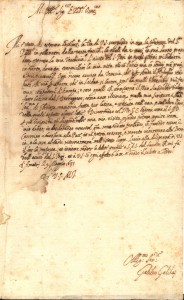(1564-1642)
THE BIRTH OF THE SCIENCE OF MECHANICS
THE BIRTH OF MATHEMATICAL ANALYSIS
(MAY 9, 1637)
GALILEO GALILEI
Italian astronomer and mathematician and physicist. The father of modern mechanics and experimental physics
Professor of mathematics at Padua (1592-1610). Improved the refracting telescope (1610) and was the first to use it for astronomy.
In 1638 Galileo published his greatest work Discorsi e Dimostrazioni Mathematiche intorno a due nuove scienze (Dialog on Two New Sciences), announced in this letter, which was the birth of Mechanics as a Science and also the birth of Mathematical Analysis as opposed to Aristotle’s verbal-logical method of analysis. This work formed the basis of Newton’s first two Laws of Motion although Galileo was stopped short of the discovery of these laws as he did not accept gravitation as an universal force.
Although he never connected “force” and “motion”, Galelio did discover
1. The law of uniformly accelerated motion towards the Earth. [demonstrated in the famous, but purely fictional, leaning tower of Pisa experiment].
2. The application of the pendulum to regulate clock mechanisms.
3. The path of a projectile is a parabola.
The letter also announces his retirement.
There exist only four known examples of the handwriting of Galileo in the Western Hemisphere.
Transcription:
Galileo to Benedetto Guerrini in Florence.
Arcetri, 9 May 1637
Molto Ill.re Sig.re e Pad.ne Osser.mo
Mi è stata di estrema consolazione la lettera di V.S., scorgendo in essa la prontezza del Serenissimo
Padrone in sollevarmi dalle tante fatiche, le quali da due mesi in qua hanno grandemente oppressa la
mia vecchiaia. L’aiuto del Signor Peri in pochi giorni mi condurrà in porto, dove poi tranquillerò la mia vita, non con l’ozio, ma con studi meno gravi e più piacevoli. Oggi ricevo avviso da Venezia che è per strada il primo foglio stampato, che vien per caparra che in Leiden si lavora per me da quelli Elzevirii, più famosi stampatori d’Europa; e sono quelli che stamporno il mio Dialogo, fatto latino dal Signor Berneggero, come anche ultimamente quella mia scrittura a Madama Serenis., di gloriosa memoria, fatta pur latina e stampata nell’una e nell’altra lingua, della quale aspetto alcune copie.
Discorrendo col Signor Principe Gio. Carlo, compresi come il S.G.D., per sua benignità, non disgradirebbe una mia visita, quando potesse seguire senza mio danno. Io, desiderando una tal grazia, sono andato pensando, che facendo essere un carrozzino a buon’ora alla Pace, io vi potrei entrare, e serrato venirmene alla Petraia, e la sera al tardi ritornarmene nell’istesso luogo. Lascio alla diligenza di V.S. di far la proposta, ed insieme render le debite grazie a S.A.S. del favore che mi fa dell’aiuto del Signor Peri: ed a V.S. con ogni affetto bacio le mani, e rendo il saluto a Tordo.
D’Arcetri, li 9 Maggio 1637.
Di V.S. M.I.
Obblig.mo Ser.re,
Galileo Galilei
Translation:
Most Illustrious Lord and Most Attentive Master,
Your Lordship’s letter gave me great comfort, discerning in it the willingness of the Most Serene Master to lift me from the many difficulties which have resulted from my two months spent in here, and which have greatly oppressed my old age. The support of Signor Peri in a few days will bring me to a safe haven, where I shall subsequently lead a more tranquil life, not with idleness, but with studies less serious and more pleasant. Today I received a notice from Venice, that the first printed sheet is on its way, which comes as evidence that the Elzeviri, the most famous printers in Europe, are working for me in Leiden; they are also the ones that printed my Dialogue, translated into Latin by Signor Berneggero, just as has also been done recently with my writings to Madama Serenis, of glorious memory, translated into Latin and printed in the one and in the other language, of which I await a few copies.
Talking with Signor Principe Gio. Carlo, I understood that His Grace the Duke, through his kindness, would not be displeased to receive my visit, if that could be done without damaging my health. I, desirous of such a grace, have been thinking that, if a small carriage were to be sent to La Pace in good time, I might enter there, and sheltered by it [from the elements], travel from there to Petraia, and late the same evening return to the same place [La Pace]. I leave it to Your Lordship’s diligence to propose this, and at the same time to render due thanks to His Most Serene Highness for the favour which is done to me by the provision of the support of Signor Peri: and I kiss Your Lordship’s hand with every affection, and return my greetings to Tordo.
Arcetri, 9 May 1637,
Of Your Most Illustrious Lordship,
Your most devoted sevant,
Galileo Galilei

